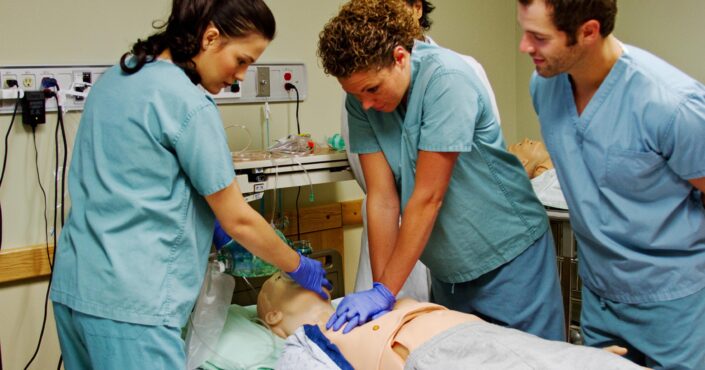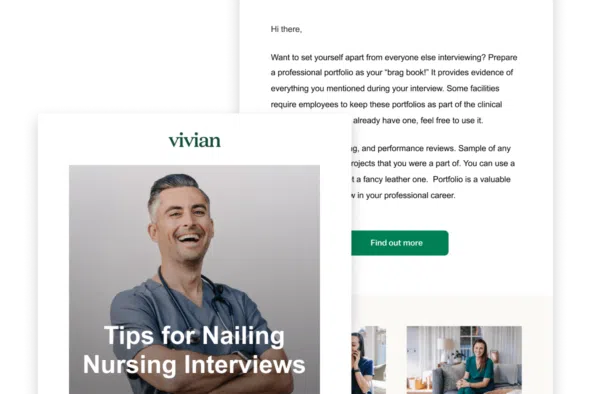No matter how much you enjoy your current job, there’s nothing wrong with exploring new options. If you decide to switch specialties, completing a nursing fellowship is a great way to learn new skills, network with other RNs and discover how to provide a higher level of care to patients of all acuity levels. This guide explains what a nurse fellowship is and offers valuable tips for landing a fellowship slot of your own.
What Is a Nurse Fellowship?
Nurse fellowship programs help experienced RNs transition into their desired specialties. For example, if you currently work in pediatrics, you could find a fellowship designed to ease the transition into labor and delivery or postpartum care. Nursing fellowships are common, as they benefit healthcare organizations as much as participants. Hospitals with fellowship programs tend to attract high-quality applicants, making it easier to meet current and future staffing needs. Some organizations also view RN fellowships as a way to address shortages in intensive care, mental health and other specialties.
Nurse Fellowship vs. Residency
Although some people use the terms fellowship and residency interchangeably, the two have distinct differences. Nurse residencies help recent graduates needing support as they transition into nursing practice. A residency usually includes a combination of classroom learning, mentoring and hands-on experience. The classroom portion of the program focuses on the knowledge and skills a new graduate needs to excel in their chosen specialty and helps them land a new graduate nursing job or the rare new graduate travel job.
Conversely, a nurse fellowship generally aims to help an experienced RN transition to a new nursing specialty or learn how to provide a higher level of care. However, some fellowships focus on learning the skills needed to succeed in management and research roles. For example, Penn Nursing and the Wharton School have partnered with Johnson & Johnson to offer a 1-year fellowship for senior nurse leaders interested in advancing healthcare through leadership and innovation.
Is a Fellowship More Difficult Than a Residency?
Because each type of program has a different purpose, you can’t accurately compare the two in terms of difficulty. However, new graduates have unique challenges, such as transitioning from student to full-time nurse mode. Likewise, nursing school certainly isn’t easy but requires a different set of skills. You must study to pass the NCLEX certification exam, get good grades in your nursing courses and succeed in your clinical placements.
How Does a Nurse Fellowship Work?
Hospitals develop nurse fellowships to meet their specific needs, so every program differs. That said, nurse fellowship programs typically have a few features in common. For example, programs usually last for several months up to one year and begin in the classroom before transitioning to working in a hospital under a specialist’s supervision. Also, each participant gets to choose their specialty. Many hospitals have career pathways for RNs interested in transitioning to labor and delivery, intensive care or emergency department nursing. You may also find a nurse fellowship in a burn unit, cardiac catheterization lab or rehabilitation center.
Compensation and Benefits
Fellowships aren’t like the unpaid internships completed by many college students. Instead, these programs provide a nursing salary. Participants may even qualify for insurance and other benefits in some programs. For example, Memorial Hermann Health System nursing fellows qualify for health coverage, student loan repayment, certification reimbursement, tuition reimbursement and an employee assistance program. Some healthcare employers may offer a completion bonus to every nurse who finishes a fellowship. As of March 14, 2023, Memorial Healthcare System in Hollywood, Florida, offered a completion bonus of $10,000.
Education and Skill Development
Although each program has unique features, most fellowships include seminars, lectures, clinical rotations and other activities designed to help participants broaden their knowledge and develop new skills. For example, Northwell Health offers multiple specialty tracks that all include simulation experiences using SimMan, SimBaby or other anatomically correct mannequins. The organization operates several facilities in New York City, Westchester and Long Island, New York.
Application Requirements
Although every program is a bit different, most nursing fellowships have some application requirements in common. Be prepared to meet the following criteria.
Academic Performance
Your preferred program may require a minimum grade point average (GPA). Colleges calculate your GPA by dividing the total number of grade points earned by the total number of credits attempted. Some healthcare organizations have more stringent requirements than others. For example, New York’s Mount Sinai Health System requires applicants for its emergency department nursing fellowship to have a GPA of at least 3.2 on a 4.0 scale.
Nursing Licensure
Because nursing fellowships are for experienced nurses, you must have a valid nursing license before you apply. If it’s almost time to renew your license, complete all continuing education requirements well before your renewal date. Depending on where you live, your state board of nursing may require you to submit proof of completion. It takes time for a board representative to review your documentation and process the renewal, so if you leave it to the last minute, your license may lapse.
Background Check
If you’re applying for a fellowship with your current employer, you may not have to complete this step, but some fellowship programs require applicants to submit a background check. At Community Medical Center in Missoula, Montana, an authorized representative also checks to ensure each applicant doesn’t appear on the National Sex Offender Registry or the Office of Inspector General (OIG) exclusion list. The OIG exclusion list contains the names of people excluded from participating in Medicaid, Medicare and other federal healthcare programs.
Top Nursing Fellowship Programs
Mount Sinai Health System
Mount Sinai Health System offers nursing fellowships in several specialties. Its flagship facility in New York City has opportunities for Bachelor of Science (BSN)-prepared nurses interested in working in the emergency department. Applicants must meet the following requirements:
- Pass NCLEX before the cohort start date
- Commit to 2 years of employment at Mount Sinai
- Hold a New York RN license
- Interview successfully
- Have a GPA of 3.2 or higher
The South Nassau location has fellowships available in these five departments:
- Operating Room
- Emergency Department
- Critical Care
- Labor and Delivery
- Maternity/Neonatal Intensive Care Unit
Each fellowship lasts 3 to 6 months, allowing participants to gain confidence in their new specialty. To qualify, you must have a valid New York RN license, Basic Life Support certification from the American Heart Association and the flexibility necessary to work all shifts while in the program.
Mayo Clinic Arizona Fellowship in Perioperative Nursing
If you’re interested in operating room nursing and willing to relocate to Arizona, consider the Perioperative Nursing Fellowship at the Mayo Clinic Arizona. This program includes didactic and clinical components, giving participants plenty of support as they develop the skills necessary to succeed in the operating room. Clinical rotations focus on scrubbing and circulating in various procedures, making it easier to determine if you want to specialize even further at some point in your career. Participants who complete the entire program receive 40 contact hours from the Association of Perioperative Registered Nurses and 16 college credit hours from the Mayo Clinic School of Health Sciences.
Northwell Health
Northwell Health offers the following fellowship opportunities for nurses:
- Emergency Department
- Pediatrics
- Critical Care
- Oncology
- Perioperative Nursing
Every fellowship includes some combination of education, mentoring, simulation experiences and clinical rotations to help participants learn relevant skills. The length of a fellowship depends on which specialty you choose. For example, the oncology option lasts 16 weeks, while the emergency department fellowship takes several months. Northwell Health has several cohorts yearly, increasing access to these valuable educational opportunities.
Pros and Cons of Nursing Fellowships
Advantages of Nurse Fellowship Programs
One of the primary benefits of a nursing fellowship is that you get paid to learn. You won’t have to worry about performing unpaid work or balancing a fellowship with a part-time job to ensure you can continue paying your bills. You may even qualify for benefits, reducing out-of-pocket health expenses and providing access to perks that can make your nursing career even more rewarding.
Completing a fellowship is also a great way to network with other nurses and learn from their experiences. Many nurse fellowship programs include mentoring or preceptorships, allowing you to ask questions and get guidance from nurses with decades of experience in your specialty of interest.
Nursing fellowships are also helpful for RNs interested in becoming travel nurses. Travel nurse agencies for new graduates without experience typically don’t exist. Travel jobs are usually reserved for nurses with extensive experience. Completing a fellowship provides more experience, so you may qualify for more travel nursing opportunities, making it easier to increase your income.
Disadvantages of Nurse Fellowship Programs
Although fellowship programs have many benefits, a couple of drawbacks exist. One of the main disadvantages is that some programs require you to be flexible about your work hours. During a fellowship, you typically work at least 40 hours per week, but your employer may require 12-hour shifts or overnight work. Another disadvantage is that you must usually commit to remaining at the facility for a certain length of time. This requirement could prevent you from accepting a more lucrative opportunity elsewhere.
How to Get a Nursing Fellowship
If you’re interested in a nursing fellowship, there are a few things you should do to prepare for the application process. First, perfect your nursing resume and ensure everything is up to date. It’s one of the first things a recruiter sees, so it needs to make a great impression. Next, make sure your licensing paperwork is in order. If you need to complete any continuing education requirements or pay renewal fees, do so well in advance of the application deadline. Finally, brush up on your interviewing skills. You may have to complete several interviews with program directors or preceptors, so communicating effectively regarding your knowledge and experience is essential.






